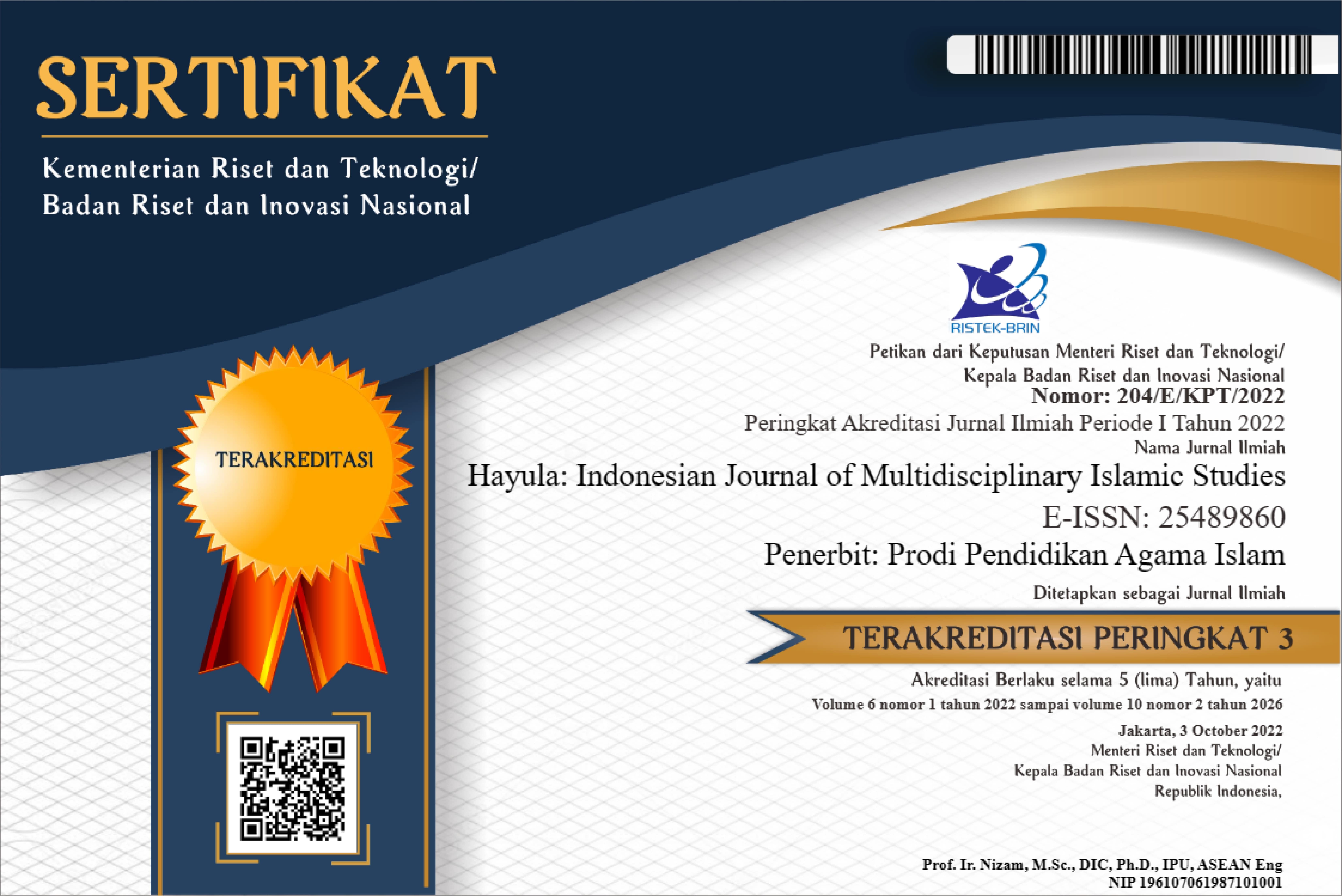Halal Food di Era Revolusi Industri 4.0: Prospek dan Tantangan
DOI:
https://doi.org/10.21009/hayula.003.2.01Keywords:
industry, halal food, revolution 4.0Abstract
The rapid change of industrial technology has increased some artificial intelligence in many aspects, including halal food. This paper seeks to find out the halal food industry in the era of the Industrial Revolution 4.0 and its impact on the existence of halal food in Indonesia. During Industrial Revolution 4.0, it is easy to manage halal food in terms of production or marketing process through sophisticated machine, complete laboratorium, modern halal valley, or artifical intelligences based applications. All of these aspects contribute to the halal food industries in Indonesia, since they are possible to be more popular, boarder in marketing, more effective in production, quicker in menu, more competitive in market. The halal food industry, in fact, has to be charged in global competitivenes.
References
Azizi Y, A. &. (2013). Azizi Y, A & The Role of Kesadaran Halal, Sertifikat Halal, and Marketing Components in Determining Halal Minat Beli among Non-Muslim in Malaysia: A Structural Equatuon Modeling Approach. Azizi Y, A & Chok N, V. (2013). “The Role of Kesadaran Halal, Sertifikat Halal, and Marketing Components in Determining Halal Minat Beli amonJournal of International Food & Agribusiness M, 1-23.
Azmar, N. J. (2018). Masa Depan Perpustakaan Seiring Perkembangan Revolusi Industri4.0: Mengevaluasi Peranan Pustakawan. Iqra', 35-36.
Deny, S. (2018). Tiga Tantangan Pekerja Era Revolusi Industri. kemenristerdikti online.
Fadhilah, I. R. (2018, 03 19). 6 Aplikasi Makanan Halal yang Perlu Diketahui. Retrieved from republika: http://m.facebook.com/sharer.php?t=6+aplikasi+makanan+halal+yang+perlu+diketahui&u=http://republika.co.id/share/p5u55a328
H Kagermann, W. W. (2013). Kagermann H., Wahi Recommendations for implementing the strategi initiative Industri 4.0 Working Group. Forschungsunion: Acatech. Forschungsunion: Acatech.
Hasan, S. (2014). Sertifikat Halal Dalam Hukum Positif. yogyakarta: pessindo.
Irianto, D. (2017). Industri 4.0: The Challenges of Tomorrow. Seminar Nasional Teknik Industri. Batu-Malang.
Jalaluddin, R. (1997). Hegemoni Budaya. Yogyakarta: Yayasan Bentang Budaya.
Kargwell., A. F. (2015). Sosial Media, Consumer Behavior and marketing Strategi: Implication of “halal” on Islamic marketing Operations. Journal of Small Business and Entrepreneurship Development, 36-43.
Mufraini, M. A. (2011). Etika Bisnis Islam. jakarta: kencana.
Mukafi. (2014). “Sucofindo Bangun Laboratorium Halal Canggih, ”. N.-b.-l.-h.-c. (2014, agustus 22). Sucofindo Bangun Laboratorium Halal Canggih. Retrieved from NU Online: http://www.nu.or.id/post/read/51354/sucofindo-bangun-laboratorium-halal-canggih
P. Zang, G. V. (2002). Use Expecations and Rankings of Quality Factors in Different Website. International Journal of Electronic Commerce, 9-33.
Rachman, V. (2018, desember 13). Halal Quest Incar 10 Ribu Pengunduh. Retrieved from Swa Online : https://swa.co.id/swa/trends/technology/halal-quest-incar-10-ribu-pengunduh
Rahmawati, A. A. (2016, 01 23). Pertamina Perkenalan Pelumas’Food Grade’ Bersertifikat Halal MUI,” disampaikan pada Acara PT Pertamina Lubricants Memperkenalkan Pelumas Food Grade Bersertifikat Halal Pertama di Indonesia. Retrieved from https://food.detik.com/berita-boga/d-3288005/pertamina-perkenalkan-food-grade-bersertifikat-halal-mui
Santo, Y. (2018, april 05). Modern Halal Valley Cluster Halal Terbesar Pertama Diresmikan. Retrieved from republika.
Sung, T. K. (2017). ndustry 4.0: A Korea Perspective. Tecnological Forecasting and Social Change Journal, 40-45.
Suparti, I. G. (2018). Giyanti, IPenilaian Kualitas Aplikasi Halal MUI dengan Webqual 4.0 dan Pengaruh Terhadap Kualitas Penggunaan. Jurnal Teknik Industri, 96-97.
Trandawinada, R. R. (2016). TrandawiIndustri 4.0: Revolusi Industri Abad Ini dan Pengaruhnya pada Bidang Kesehatan dan Bioteknologi. Medicinus, 4.
Utama, S. S. (2010). Pengaruh Teknologi Informasi dalam Perkembangan Bisnis. Jurnal Teknologi dan Sistem Teknologi Informasi, 62-63.
Yahya, M. (2018, 02 21). Era Industri 4.0: Tantangan dan Peluang Perkembangan Pendidikan Kejuruan Indonesia. Orasi Ilmiah Professor bidang Ilmu Pendidikan Kejuruan Universitas Negeri Makassar, 7-9.
Yono, A. m. (2005). Hukum Perlindungan Konsumen. jakarta: raja grafindo persada.
Yulia, O. Y. (2000). Penggunaan Teknologi Internet dalam Bisnis. Jurnal Akuntansi & Keuangan, 4.
Downloads
Published
How to Cite
Issue
Section
License
Authors who publish with this Journal agree to the following terms:
- Author retain copyright and grant the journal right of first publication with the work simultaneously licensed under a creative commons attribution licensethat allow others to share the work within an acknowledgement of the work’s authorship and initial publication of this journal.
- Authors are able to enter into separate, additional contractual arrangementfor the non-exclusive distribution of the journal’s published version of the work (e.g. acknowledgement of its initial publication in this journal).
- Authors are permitted and encouraged to post their work online(e.g. in institutional repositories or on their websites) prior to and during the submission process, as it can lead to productive exchanges, as well as earlier and greater citation of published works.
Users/public use of this website will be licensed to CC BY






